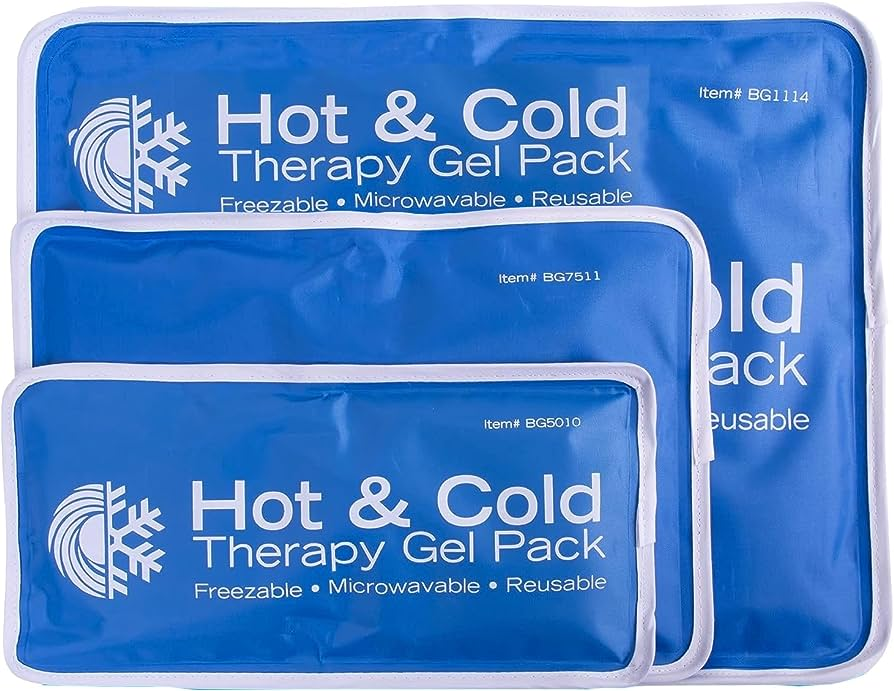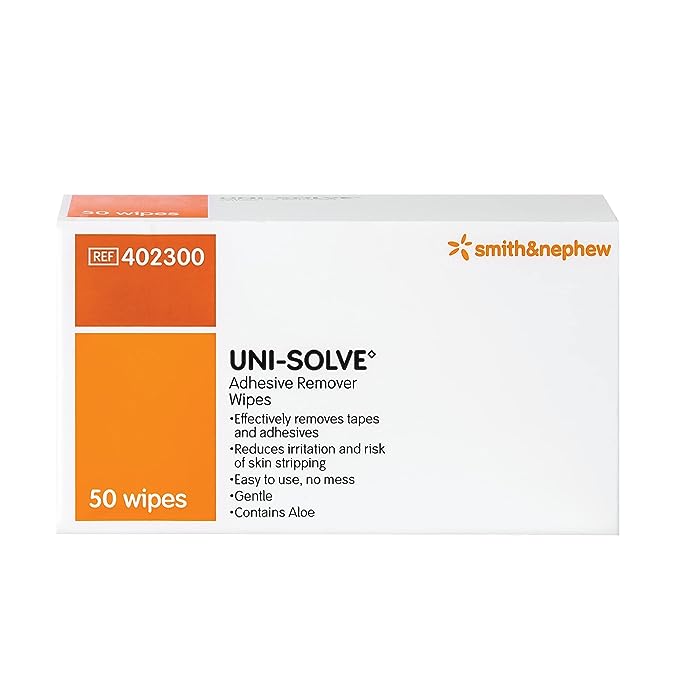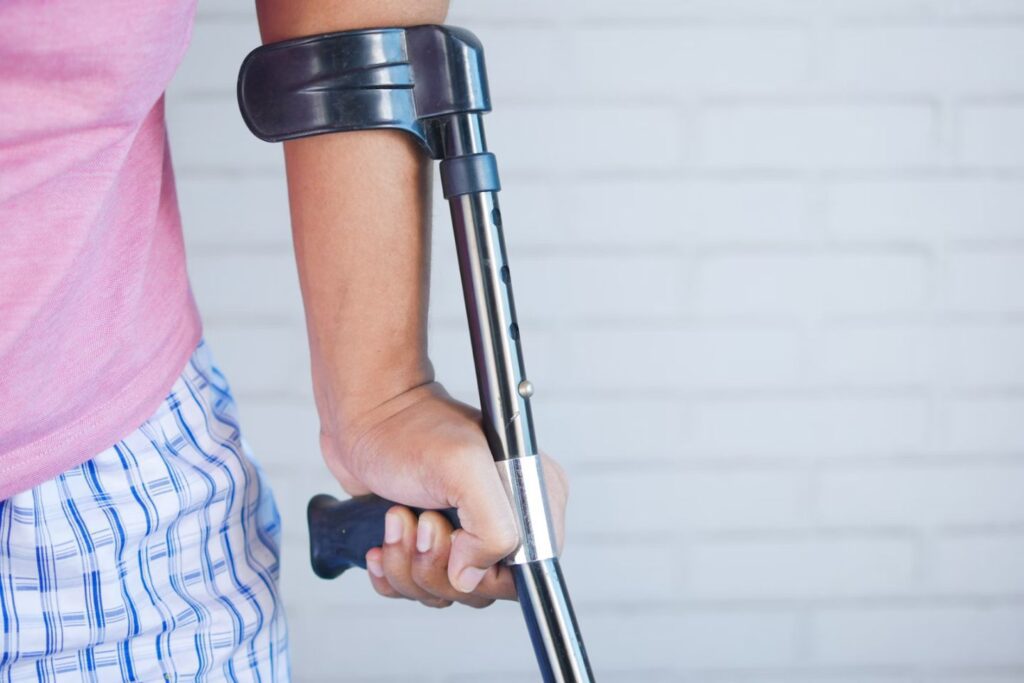Surgical procedures, particularly hip replacement surgeries, can be a challenging ordeal. The procedure, also known as hip arthroplasty, involves removing diseased parts of the hip joint and replacing them with a prosthetic implant.
The procedure aims to relieve pain from the damaged or diseased hip joint, increase mobility, and improve the hip joint’s function. It is a relatively common surgery. From 2020-2021, around 2.4 million hip and knee surgeries were conducted in the United States.
Depending on the patient’s health, it can take several weeks to recover from this type of surgery. Proper hospital and home care are essential to aid in recovery.
If someone you know has recently undergone this procedure, sending a gift is an excellent way to cheer them up and improve their mood. Read on for some post-surgery gifts you could give to your loved one.
Key Takeaways
|
Our Top Picks
| Image | Product Name | Best Of | |
| Roscoe Reusable Hot and Cold Pack | Hot and cold pack | ↓ Jump to Review | |
| EZY DOSE Weekly Pill Organizer | Medication management | ↓ Jump to Review | |
| Champion Women’s Jersey Pants | Comfort | ↓ Jump to Review | |
| Uni Solve Adhesive Remover Wipes | Body care | ↓ Jump to Review | |
| Mindful Patterns Coloring Book | Relaxation | ↓ Jump to Review |
1. Best hot and cold pack: Roscoe Reusable Hot and Cold Pack


Pros:
- Provides easy pain relief
- Reusable and gentle on the skin
Cons:
- May burn the skin if not allowed to cool down
- May further harm open wounds
Recovering from hip replacement surgery often involves dealing with pain. Doctors often recommend painkillers to help the patient manage it. However, they may still experience pain at different points of the day.
For this reason, a heating pad or a cold pack could be beneficial during recovery. Heat and cold compress are simple ways to relieve pain or swelling the patient may experience.
A reusable hot and cold pack like the one from Roscoe could be a valued gift for someone recovering from hip replacement surgery. It’s affordable, reusable, and easy to use for days when they need extra pain relief.
Cold therapy can treat and relieve acute and incisional pain, which patients often experience immediately after surgery. The cold can constrict blood vessels, minimizing swelling and bruising.
On the other hand, heat and warmth can help soothe chronic or muscle pain. It helps improve circulation in the area where you apply it and can aid in dissolving bruises.
2. Best for medication management: EZY DOSE Weekly Pill Organizer


Pros:
- Assists in adhering to medication schedules
- Helps prevent missed doses
Cons:
- Requires manual refilling
- May not be suitable for people with limited dexterity or fine motor skills
Post-surgery recovery often involves taking a cocktail of medications to manage pain and other potential side effects. For this reason, it can be challenging to keep up with your medication schedules and not miss important doses.her potential side effects. For this reason, it can be challenging to keep up with your medication schedules and not miss important doses.
The EZY DOSE Weekly Pill Organizer provides ample space to place medications for the week. Your loved one or their caretaker could fill it at the start of each week to help ensure they follow the doctor’s prescribed doses.
A pill organizer is also a good gift, as it can stay helpful even after the patient has recovered from hip replacement surgery. They can continue to use it for vitamin supplements or other medications.
3. Best for comfort: Champion Women’s Jersey Pants


Pros:
- Soft and comfortable cotton fabric
- Easy to put on and take off
Cons:
- Limited designs
- Not suitable for all events
After a hip replacement surgery, the area surrounding the hip might still be a bit sore and difficult to move. It’s important to prioritize comfort during recovery to ensure daily activities don’t negatively impact the healing process.
Skinny pants and other tight-fitting clothing might be one’s preference, but they can be a pain to wear and take off. Wearing and undressing at the end of the day could put undue stress on the surgical wound and affect its healing.
For this reason, comfortable, loose clothing like the Champion Women’s Jersey Pants is an excellent gift. Find out your loved one’s size and give them a pair of comfy sweatpants they can add to their outfit rotation.
4. Best for body care: Uni Solve Adhesive Remover Wipes


Pros:
- Easily removes medical adhesives from bandages and dressing tapes
- Skin-friendly
Cons:
- Flammable
- May irritate open wounds or mucus membranes
After surgery, the hip area will be dressed with bandages and dressing tapes containing strong medical adhesives. These adhesives protect the wound from outside elements and help ensure it doesn’t get infected.
However, part of caring for the patient involves changing these bandages, which can leave a sticky residue on the skin. If well-protected, the dressings may also be difficult to remove without a certain degree of pain.
For this reason, Uni Solve Adhesive Remover wipes would be an excellent gift or part of a care package for someone who has undergone surgery. These wipes help ease the removal of adhesive residue from bandages and other medical adhesives. It helps minimize pain and speed up the cleanup process.
5. Best for relaxation: Mindful Patterns Coloring Book


Pros:
- Promotes stress relief and mindfulness
- Creates an avenue for artistic expression
Cons:
- May be time-consuming
- May limit creativity
When recovering from hip replacement surgery, your loved one may not be able to move around as much and perform their regular tasks. The healing process could involve much sitting around with little to do.
The Mindful Patterns Coloring Book is an excellent gift for someone who might need extended rest. It has over 50 unique, detailed designs your loved one could enjoy coloring. Instead of spending their entire resting time watching Netflix, they could bust out the crayons and color for hours.
Coloring might seem like a kid’s activity, but it can offer benefits for adults, as well. The patterns in the coloring book are detailed and intricate. The act of coloring can be therapeutic and meditative, promoting relaxation and a sense of calm.
While physical recovery is the priority when healing from surgery, one’s mindset is also a significant factor in strengthening overall health.
Other Thoughtful Gifts After a Hip Replacement Surgery
While we have outlined five of the best gifts you can send someone after a hip replacement surgery, you also have many other options. Gift-giving is an art, and you can get creative when finding something to send or curating a gift box for your loved one.
The doctor and their team have done most of the work to improve the patient’s health. Sending a thoughtful gift or surgery care package lets your family member or loved one know you are thinking of them.
Here are some other thoughtful gifts you can give someone who has undergone hip replacement surgery:
Pillow
After surgery, comfort and support are crucial for a smooth recovery. Pillows designed specifically for hip surgery patients can provide both.
You can choose from various options, such as orthopedic, body, and head pillows. Memory foam or gel-infused pillows are also excellent options. They offer softness and comfort while adjusting to the body’s contours.
Aside from comfort, pillows offer much-needed support for various body parts, especially when sitting or lying down for extended periods.
When choosing a pillow to give a friend or family member, opt for ones with removable and washable covers. This feature helps ensure cleanliness, which is crucial when recovering from surgery.
Water bottle
Staying hydrated is crucial during the healing process of hip replacement surgery. However, your loved one might be experiencing limited mobility after the procedure due to body pains and advice from the doctor.
For this reason, a water bottle would be an excellent gift for someone in recovery. Look for accessibility features such as a straw, a flip-top lid, and an easy-to-grip handle. These features help ensure the person’s comfort and reduce strain when using the water bottle, even with limited mobility.
Insulation is also a helpful feature. Your loved one may prefer their drinks at a specific temperature. An insulated water bottle helps keep hot and cold beverages at a desired temperature for longer. This feature helps minimize trips to reheat a drink or add ice, which adds to a stress-free experience.
Skincare products
During the recovery period, spending more time resting might lead to dry or chapped skin, which can be uncomfortable. These effects could worsen in a hospital environment where the air is often extra dry.
Nourishing moisturizers and lotions can help alleviate any facial or bodily skin dryness. Moisturizers can improve the skin’s hydration and help prevent irritation. If you’re unsure about your loved one’s skincare preferences, you can choose fragrance-free options to avoid triggering sensitivities.
Aside from dry skin, chapped lips can also be a common problem. To address this issue, you can include a moisturizing lip balm in your care package. A soothing lip balm can provide instant relief and help maintain soft, healthy lips.
Gifting skincare can be a hit or miss unless you know a person’s routine. To stay safe, choose skincare products made from gentle, hypoallergenic ingredients.
Greeting cards
A simple yet meaningful card can communicate your empathy, encouragement, and well wishes during your loved one’s recovery. Whether accompanied by another gift or on its own, a carefully chosen card offers a personal touch.
Consider opting for a get-well card with a warm and uplifting message. Depending on your relationship with the recipient, you can also send one with a touch of humor. Cards with witty messages like “hip hip hooray” are sure to bring a smile to their face.
If you have inside jokes or shared memories, including them can create a sense of comfort and familiarity. It’s also important to ensure your card communicates a message of warmth, strength, and hope. Of course, no hospital greeting card is complete without adding a “get well soon” message.
Undergoing recovery and bed rest could be lonely at times. A heartfelt greeting card is a tangible representation of the love and care surrounding the patient.
Scented candles and essential oils
Aromatherapy has the potential to promote well-being and reduce stress. For this reason, scented candles and essential oils are excellent candidates for thoughtful gifts you could send to someone recovering from surgery.
Scented candles infused with fragrances like lavender or chamomile can create a soothing ambiance in their home or recovery space. The flicker of candlelight can also add an element of tranquility to the environment.
Essential oils are also a versatile aromatherapy gift. You could put them in diffusers or dilute them for massages. Oils like peppermint and eucalyptus can be refreshing and ease discomfort. Lavender and chamomile oils can also aid in peaceful sleep and promote relaxation.
While these scents may not offer medicinal benefits, they help provide a cozy and relaxing environment conducive to healing and recovery.
Gift cards
If you’re having difficulty selecting a get-well gift for someone recovering from hip replacement surgery, gift cards are an excellent option. A gift card is practical and versatile, as it gives your loved one the freedom to choose what to do with it.
You could give them one from their favorite store, restaurant, or streaming service. The recovery process could leave them with limited mobility. A gift card to some of their favorite spots can help bring comfort to their home, even when going out isn’t an option.
While some may consider gift cards a copout, they can be thoughtful gifts communicating your consideration for your loved one’s choices.
Cozy socks
After surgery, comfort is a priority. Cozy socks are an excellent addition to your gift basket as they provide warmth and comfort, especially in chilly weather or hospital environments.
Soft materials like fleece or chenille are gentle on the feet, keeping your loved one snug and cozy during their recovery.
You could also opt for socks with non-slip soles for added practicality and safety. Non-slip soles help provide stability, especially when the patient has limited mobility.
Home Care Considerations After a Hip Replacement Surgery
Image by Michelle Leman on Pexels
After hip replacement surgery, the patient may need to stay at the hospital for a few days. When the doctor deems it fit to discharge the patient, they may resume their recovery at home.
While a hospital discharge may communicate a level of independence for the patient, they still need to spend considerable time recovering at home. For this reason, the patient and their loved ones need to prepare for changes to the house and their lifestyle to accommodate recovery.
Here are some of the primary considerations and adjustments patients and loved ones could make to prepare for home recovery:
Home preparation
Creating a conducive environment is crucial for a successful hip surgery recovery. Proper home preparation can help manage potential challenges and ensure the patient’s comfort and safety.
You can start by decluttering your living spaces and removing obstacles that might hinder movement. Arrange your furniture to provide clear pathways that allow easy access to key areas like the kitchen, bathroom, and bedroom.
Creating a specific space for the patient to rest in the living room is a good idea. Place all their essentials within arm’s reach, such as their water bottle, telephone, remote control, etc. This practice helps minimize the need for bending and stretching, which can strain the patient’s injuries.
In the bedroom, provide a comfortable mattress. Place pillows strategically to ensure proper support even while sleeping or resting. If you have the time or resources, you can add bedrails for additional stability and assistance.
For bathroom support, you can install grab bars near the toilet and shower to improve balance. A shower chair is also an excellent addition to minimize strain on the hip joint when taking a shower.
Lastly, check the lighting in all areas of the home that are accessible to the patient. Keeping the house well-lit can help prevent bumps and falls.
Wound care
Proper wound care is crucial when recovering from hip replacement surgery. Ensuring the surgical site remains clean, dry, and infection-free is essential for a successful recovery.
Make sure you regularly inspect the surgical site following the surgeon’s instructions. Watch out for signs of infection, such as increased redness, swelling, warmth, or discharge.
Most surgeons apply wound dressings in a sterile manner. These dressings or bandages could stay on the skin for 7 to 10 days. During this period, keep the area clean and ask for instructions on how to handle the dressing.
It’s always a good practice to wash hands regularly. Taking extra care with personal hygiene is vital when dealing with a surgical wound.
Washing hands thoroughly before touching the surgical site can prevent the introduction of harmful bacteria. When drying the wound after washing, use a clean towel and avoid rubbing the area to prevent irritation.
Contact the patient’s doctor or health provider immediately if any concerns or issues arise concerning the wound’s healing.
Managing swelling
Swelling around the surgical area is a natural response to the body’s healing process, and you can expect it up until six months after hip replacement surgery. However, swelling can be very uncomfortable for the patient, so it’s essential to find ways to manage and minimize its effects.
Elevating the operated leg slightly, especially during rest periods, can aid in reducing swelling. You can prop pillows or cushions under the foot to keep the leg above heart level.
Another effective way to reduce swelling is by using ice packs. You can purchase reusable ice packs that you can chill in the fridge.
If you don’t have one, you can also wrap ice cubes in a clean piece of fabric and place them on the affected area. Avoid placing ice directly on the patient’s skin, as this can feel uncomfortable and may cause frostbite if done incorrectly.
Compression stockings, as recommended by the doctor, can also help minimize swelling and improve blood circulation.
Reach out to your doctor if you notice excessive or persistent swelling, especially if accompanied by other symptoms. These symptoms may signal problems in the healing process.
Medication
Proper medication management is crucial for effective home care after hip replacement surgery. Ensuring the patient takes the prescribed medications as directed is essential to managing pain and inflammation. This practice also helps prevent complications.
Caregivers must keep a detailed record of the prescribed medications, dosages, and schedules. Pill organizers could be beneficial at this stage. Alarms and reminders can help you adhere to the recommended medication schedule.
Avoid changing medications, schedules, and dosages without a healthcare provider’s recommendation. Keep an open line of communication with the patient’s doctor and report any adverse side effects or changes you may notice throughout the recovery process.
Diet
A healthy diet is an essential part of everyday life. It is especially important when recovering from hip replacement surgery. The nutrients you get from your everyday food intake can strengthen your body and aid healing.
Foods rich in protein and fiber help strengthen the muscles, heal tissue, and maintain bowel regularity. The doctor may also recommend taking vitamin supplements like iron.
Make sure the patient stays hydrated, as well. Drinking enough water helps healing and can prevent constipation. While a healthy variety of fluids like fruit juice and water can be beneficial, it’s best to avoid alcoholic drinks.
Eating a healthy amount of food each day can keep the patient strong and healthy. However, it is also important to watch one’s weight to avoid putting excess strain on the hip joint.
Dos and Don’ts After a Hip Replacement Surgery
Giving the right gifts and providing a comfortable and healing home environment are excellent ways for friends, family members, and caregivers to accommodate the patient’s needs. However, the patient must also learn to care for themselves and act in ways that aid their healing.
The patient’s doctor will likely provide a list of precautions to care for the new hip. They may differ from case to case, depending on the surgeon’s technique and preferences. Following the dos and don’ts below can help prevent dislocating the new joint and ensure healing.
What to do
Here are some practices to help the patient continue their daily activities while keeping the hip joint safe through the healing process.
- Keep your legs facing forward.
- Use ice to manage pain and swelling, but don’t apply it directly to the skin. It’s best to use an ice pack for this purpose.
- Apply heat before exercising or doing physical therapy, as it can assist in expanding your range of motion. Use a heating pad for 15-20 minutes before performing these physical activities.
- Use crutches, walkers, or other prescribed devices to assist with walking or moving around.
What not to do
Here are some practices to avoid to prevent injury and ensure the new hip joint doesn’t dislocate or experience undue stress:
- Avoid crossing your legs.
- Avoid leaning forward when sitting up or down.
- Avoid picking something up from the floor while sitting.
- Avoid bending the waist more than 90 degrees.
- Avoid lifting heavy objects.
- Avoid demanding physical activities.
Aid Your Loved One’s Recovery Through Thoughtful Gifts
Going through hip replacement surgery and healing from it can be a long and uncomfortable process. Thoughtful gifts and assistance from friends, family, and loved ones can make the process more comfortable.
When selecting gifts to give to someone undergoing recovery, ensure that you choose items that can make life easier for them. The doctors already covered their surgery and medications. Your role is to provide material and moral support.
Disclaimer: This article is for informational purposes. It should not be taken as medical or legal advice. Always consult with a qualified professional for any health or legal concerns.
Needed hip replacement surgery due to an injury?
People undergo hip replacement surgery for various reasons. Some of these reasons may include medical conditions like osteoarthritis and rheumatoid arthritis. However, one could also need hip replacement surgery due to fractures and injuries from falls or accidents.
If the injury resulted from the actions of a negligent or malicious party, you may need to seek legal assistance. The Personal Injury Center can connect you to a lawyer or legal professional to defend your case.
Frequently Asked Questions on Hip Replacement Gifts for Her
What are the best places to find gifts for someone who has undergone hip replacement surgery?
You can buy your gifts anywhere, depending on what you plan to purchase. Online marketplaces like Amazon and Etsy provide a wide range of gift options for a loved one who has undergone hip replacement surgery. Department stores and local shops may also have suitable offerings if you want to shop in person.
What can you do for someone who had hip surgery?
Aside from gifts, you can also extend help and meaningful gestures in the following ways:
- Help them with some of their responsibilities
- Cook for them
- Carry things for them
- Be present during their recovery
- Do fun things with them
Can you buy medications for someone who had hip replacement surgery?
Yes, if you buy medications prescribed by your loved one’s doctor. Self-medication can be ineffective or harmful during recovery.
How long does it take to recover from hip replacement surgery?
The recovery timeline can differ depending on the person. Full recovery usually takes around a year. However, patients can return to work and do everyday activities within a few months.
It’s best to check with the doctor to see how the healing process is going and what activities are suitable within a certain period.



